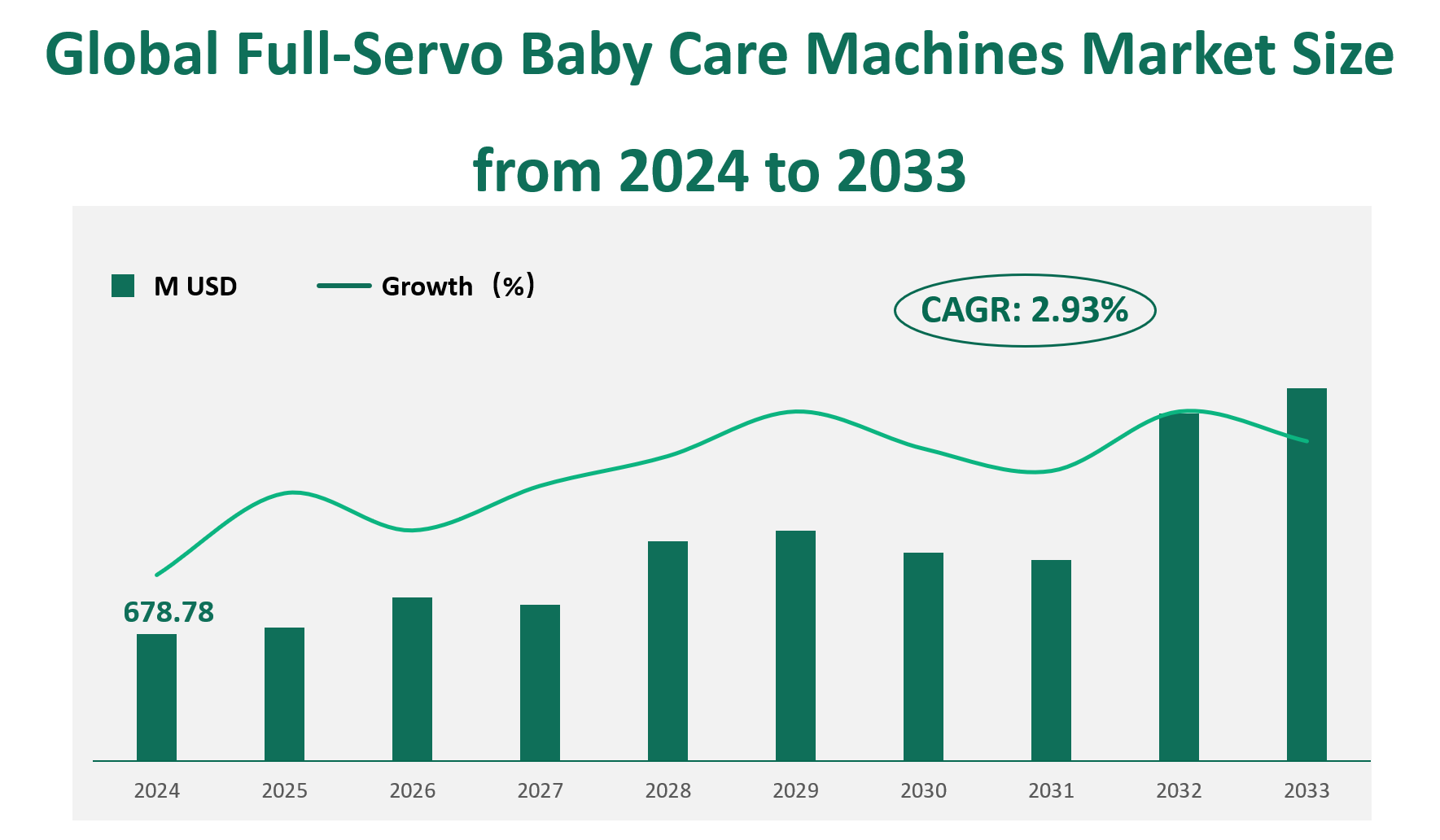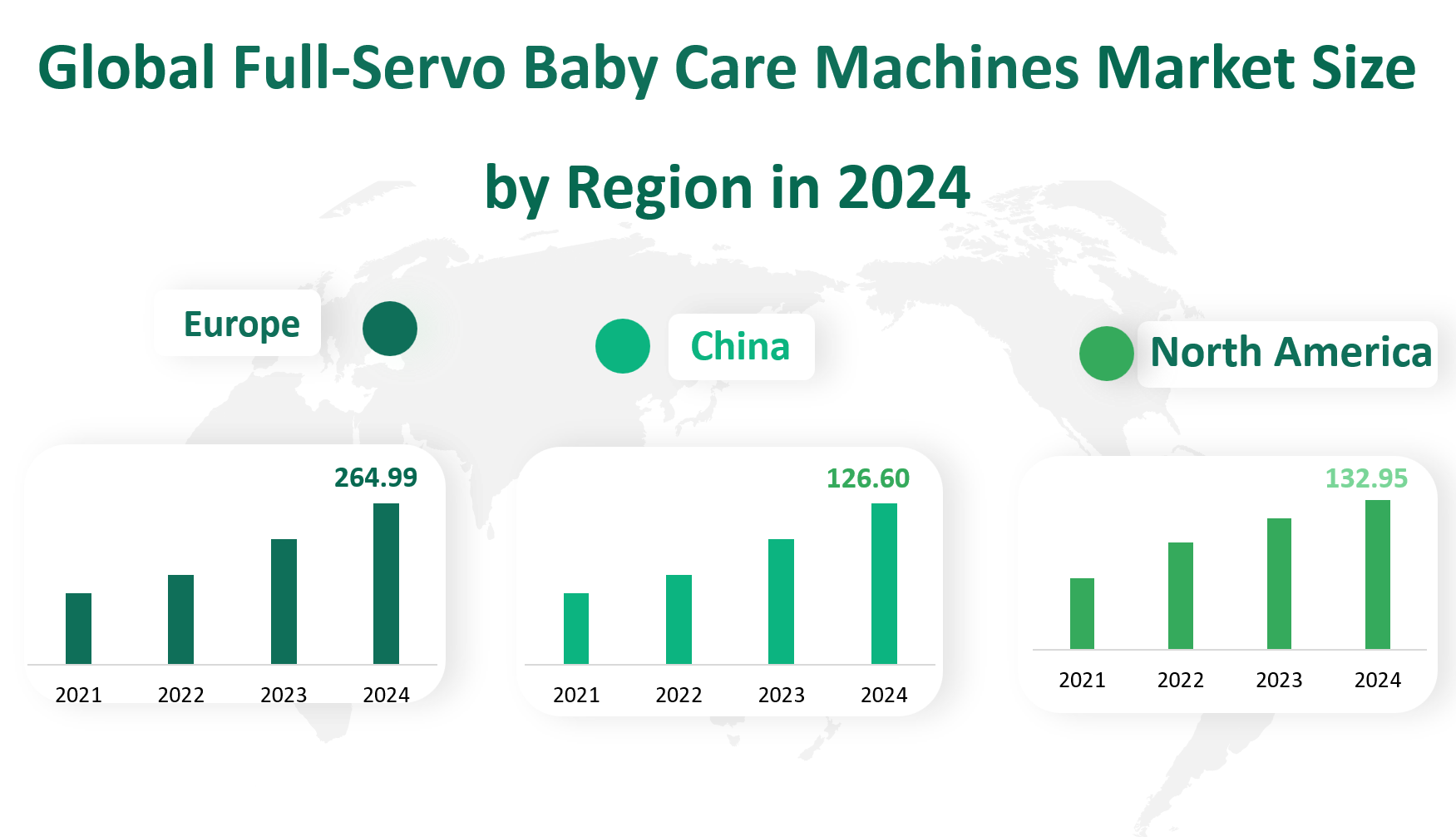1. Global Full-Servo Baby Care Machines Market Insight Analysis
The global Full-Servo Baby Care Machines market is projected to reach a value of 678.78 million USD by 2024, with a compound annual growth rate (CAGR) of 2.93% from 2024 to 2033.
Full-Servo Baby Care Machines are highly advanced industrial systems designed to automate the production of baby diapers and other infant care products. These machines utilize servo technology to achieve high precision and efficiency in manufacturing processes, significantly reducing labor costs and increasing productivity. They are capable of producing a wide range of diaper types, including waist tape and pants styles, at varying speeds, with some machines capable of producing over 800 pieces per minute.
Figure Global Full-Servo Baby Care Machines Market Size (M USD) and CAGR (2024-2033)

2. Driving and Limiting Factors of Full-Servo Baby Care Machines Market Growth
The growth of the Full-Servo Baby Care Machines market is influenced by several key factors. One of the primary drivers is the increasing global demand for baby diapers, fueled by population growth and rising disposable incomes in emerging economies such as China and India. These regions offer significant opportunities for market expansion due to their large consumer bases and growing middle-class populations. Additionally, advancements in technology have led to the development of more efficient and cost-effective machines, which further boost market growth.
However, the market also faces several limiting factors. One of the most significant challenges is the decline in fertility rates in many developed and some developing countries. This demographic trend reduces the overall demand for baby care products, thereby affecting the market for Full-Servo Baby Care Machines. Moreover, the high initial investment required for these machines, coupled with the need for regular maintenance and skilled operators, can be a barrier for small and medium-sized manufacturers. The complexity of the machines also means that they are prone to breakdowns, which can lead to production delays and increased operational costs.
3. Technology Innovation and Corporate Mergers and Acquisitions in Full-Servo Baby Care Machines Market
Technological innovation plays a crucial role in the Full-Servo Baby Care Machines market. Manufacturers are constantly seeking to improve the efficiency, precision, and flexibility of their machines. Recent advancements include the integration of full-servo drive systems, which enhance the accuracy of production processes and reduce the risk of errors. Additionally, innovations in material handling and waste reduction technologies have led to more sustainable and cost-effective production methods.
Corporate mergers and acquisitions have also shaped the market landscape. For instance, ANDRITZ’s acquisition of Diatec in 2018 expanded the company’s product portfolio and strengthened its position in the hygiene and food packaging industries. Similarly, Fameccanica’s partnership with Teknoweb Materials in 2019 introduced innovative absorbent core technology, enhancing the company’s product offerings. These strategic moves not only consolidate market positions but also drive technological advancements and product diversification.
4. Global Full-Servo Baby Care Machines Market Size by Type
High-speed machines are capable of producing more than 800 diapers per minute. They are designed for large-scale production facilities that require high output to meet the demands of extensive markets. These machines are ideal for manufacturers looking to maximize production efficiency and output.
Medium-speed machines produce between 600 and 800 diapers per minute. They offer a balance between speed and efficiency, making them suitable for mid-to-large-scale production facilities. These machines are popular among manufacturers who need to meet moderate to high production demands without the high investment required for high-speed machines.
Low-speed machines produce between 400 and 600 diapers per minute. They are ideal for smaller production facilities or those looking to scale up gradually. These machines provide a more affordable entry point into the baby diaper production market, making them suitable for manufacturers with lower production volumes.
For the high-speed machines, the market value is projected to reach $377.13 million USD. Medium-speed machines are expected to have a market value of $301.65 million USD. Low-speed machines are projected to have a market value of $678.78 million USD.
Table Global Full-Servo Baby Care Machines Market Size by Type in 2024
Market Size (M USD) 2024 | |
>800 Pieces/minute | 377.13 |
600~800 (Include 800) Pieces/minute | 301.65 |
400~600 (Include 600) Pieces/minute | 678.78 |
5. Global Full-Servo Baby Care Machines Market Size by Application
Waist tape type machines produce diapers with a waist tape design, which allows for easy adjustment around the baby’s waist. This type is popular for its convenience and ease of use, making it a preferred choice for many parents. These machines are suitable for manufacturers looking to produce diapers that offer a comfortable and adjustable fit.
Pants type machines produce diaper pants, which are designed to fit snugly around the baby’s legs and waist. They offer a more secure fit and are less likely to leak, making them ideal for active babies. These machines are popular among manufacturers who want to produce diapers that provide a secure and leak-proof fit.
The waist tape type application is projected to have a market value of $377.13 million USD. The pants type application is projected to have a market value of $301.65 million USD.
Table Global Full-Servo Baby Care Machines Market Size by Application in 2024
Application | Market Size (M USD) 2024 |
Waist Tape Type | 377.13 |
Pants Type | 301.65 |
6. Global Full-Servo Baby Care Machines Market by Top Regions
Europe stands out as the largest regional market by revenue. With a projected market value of $264.99 million USD in 2024, Europe holds a commanding 39.77% market share. This dominant position can be attributed to several factors. Europe has a highly developed industrial base and a mature market for baby care products. Additionally, the region boasts advanced technological capabilities and stringent quality standards, which drive the adoption of sophisticated Full-Servo Baby Care Machines.
China is another major player in the Full-Servo Baby Care Machines market, projected to reach a market value of $126.6 million USD in 2024. China’s market share stands at 19.09%, making it the second-largest regional market. China’s rapid economic growth, coupled with its large population, has led to a significant increase in the demand for baby care products. Local manufacturers have been investing heavily in advanced production technologies to meet this demand, contributing to the expansion of the Full-Servo Baby Care Machines market.
The North American market is also substantial, with a projected value of $132.95 million USD in 2024. North America holds a 17.10% market share, largely driven by the United States and Canada. The region’s strong consumer market, high disposable incomes, and a preference for high-quality baby care products are key factors contributing to its market size.
Japan is another significant market, with a projected value of $44.23 million USD in 2024. Japan’s market share is 9.95%. The country’s highly developed economy and advanced technological infrastructure support the adoption of Full-Servo Baby Care Machines. Japanese manufacturers are renowned for their precision engineering and high-quality products, which are in demand both domestically and internationally.
The Middle East and Africa region is expected to reach a market value of $21.31 million USD in 2024, with a market share of 2.71%. Although relatively small compared to other regions, this market is growing rapidly.
Figure Global Full-Servo Baby Care Machines Market Size by Region in 2024

7. Global Full-Servo Baby Care Machines Market Analysis by Major Players
Zuiko is one of the leading companies in the Full-Servo Baby Care Machines market. Established in 1963 and headquartered in Osaka, Japan, Zuiko is renowned for its high-quality converting machines for the production of baby and adult diapers, women’s napkins, and other disposable sanitary products. The company’s baby diaper machines, such as the DRBT-H series, are designed for high-speed production with advanced features like full servo drive systems and automatic splicing.
Fameccanica is another prominent player, known for its innovative equipment for the hygienic disposable absorbent converting industry. Founded in 1986 and based in Italy, Fameccanica offers a wide range of machines for the production of baby diapers, training pants, and changing mats. The company’s FA-X P12 machine, for example, is capable of producing up to 1200 pieces per minute with high precision.
GDM is a global leader in the disposable hygiene industry, focusing on performance, flexibility, scalability, and innovation. Established in 1986, GDM provides comprehensive solutions for the production of disposable sanitary products. Its B6-W Red Line machine is designed for high efficiency and continuous operation, capable of producing up to 600 pieces per minute.
Curt G. Joa is a North American company that specializes in machinery for the production of disposable products. Founded in the early 20th century, Curt G. Joa offers advanced technologies and engineering services for the production of baby diapers and other hygiene products. Its J7I-BP Baby Pant Machine is an example of its innovative product line.
Cellulose Converting Solutions (CCS) is a European company that engineers and installs machines for the production of disposable hygienic products. Founded in 2008, CCS offers a range of products, including machines for the production of baby diapers and incontinence products. The CCS.ND model features high efficiency and full servo-drive transmission.

